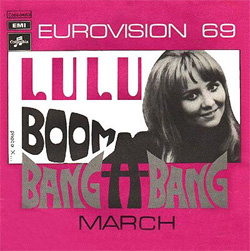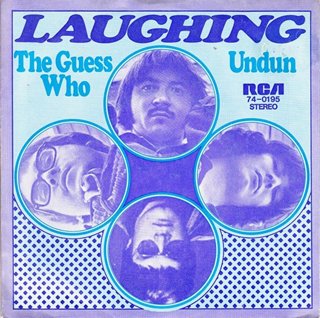
"Get Back" is a song recorded by the British rock band the Beatles and written by Paul McCartney, originally released as a single on 11 April 1969 and credited to "The Beatles with Billy Preston". The album version of this song contains a different mix that features a studio chat between Paul McCartney and John Lennon at the beginning which lasts for 20 seconds before the song begins, also omitting the coda featured in the single version. This version became the closing track of Let It Be (1970), which was released just after the group split up. The single version was later issued on the compilation albums 1967–1970, 20 Greatest Hits, Past Masters, and 1.

The Hollies are a British pop rock group formed in 1962. One of the leading British groups of the 1960s and into the mid 1970s, they are known for their distinctive three-part vocal harmony style. Allan Clarke and Graham Nash founded the band as a Merseybeat-type music group in Manchester, although some of the band members came from towns further north in East Lancashire. Graham Nash left the group in 1968 to form Crosby, Stills & Nash.
Recorded Music NZ is a non-profit trade association of record producers, distributors and recording artists who sell recorded music in New Zealand. Membership of Recorded Music NZ is open to any owner of recorded music rights operating in New Zealand, inclusive of major labels, independent labels and self-released artists. Recorded Music NZ has over 2000 rights-holders.

The Best of David Bowie 1969/1974 is a compilation album by English singer-songwriter David Bowie, released by EMI in 1997. The US release of the album was pulled from the stores because of multiple inaccuracies in the credits and liner notes. It was re-released by EMI-CAPITOL Entertainment Properties the following year (1998) in the US as part of the essential collection, with a new cover and corrected information as a limited edition. This album was also included as the first disc of the compilation The Platinum Collection (2005/2006).

"I Can Hear Music" is a song written by Jeff Barry, Ellie Greenwich and Phil Spector for American girl group the Ronettes in 1966. This version spent one week on the Billboard Pop chart at number 100. In early 1969, the Beach Boys released a cover version as a single from their album 20/20 (1969), peaking at number 24 in the US.

"Boom Bang-a-Bang" is a song recorded by Scottish singer Lulu. The song was written by Alan Moorhouse and Peter Warne. It was the British winning entry at the Eurovision Song Contest 1969, held in Madrid. It was the joint winner with three other entries: Salomé singing "Vivo cantando" for Spain, Lenny Kuhr singing "De troubadour" for the Netherlands, and Frida Boccara singing "Un jour, un enfant" for France.

"Games People Play" is a song written, composed, and performed by American singer-songwriter Joe South, released in August 1968, that won the Grammy Award for Best Contemporary Song and the Grammy Award for Song of the Year.

Sir John Edward Rowles is a New Zealand singer. He was most popular in the late 1960s, 1970s and early 1980s, and he is best known in New Zealand for his song from 1970, "Cheryl Moana Marie", which he wrote about his younger sister.

The following is the discography of the American rock band the Doors. Formed in Los Angeles in 1965, the group consisted of Jim Morrison (vocals), Ray Manzarek (keyboards), John Densmore (drums), and Robby Krieger (guitar). The Doors became one of the most popular rock bands of their era. Their debut album, The Doors (1967), released by Elektra Records, charted at No. 2 on the US Billboard 200 and produced the group's most successful single, "Light My Fire". The album received several sales certifications including a four times multi-platinum from both the Recording Industry Association of America (RIAA), and from the Canadian Recording Industry Association (CRIA). The Doors' second studio album, Strange Days (1967), sold well commercially but did not reach the same level of success as the debut, and failed to produce a major hit single. It reached No. 3 on the Billboard 200 and was certified platinum in the United States and Canada. The Doors' third studio album Waiting for the Sun (1968), was very successful, reaching No. 1 in the US and France, and produced their second No. 1 single, "Hello, I Love You". Waiting for the Sun was the first Doors album to chart in the United Kingdom, where it peaked inside the Top 20. The album was certified gold in that country by the British Phonographic Industry (BPI), as well as being certified gold and platinum in several other countries.

The discography of Fleetwood Mac consists of 18 studio albums, nine live albums, 23 compilation albums, one extended play single, and 62 singles.
"Release Me", is a popular song written by Eddie "Piano" Miller and Robert Yount in 1949. Four years later it was recorded by Jimmy Heap & the Melody Masters, and with even better success by Patti Page (1954), Ray Price (1954), and Kitty Wells (1954). Jivin' Gene [Bourgeois] & the Jokers recorded the tune in 1960, and that version served as an inspiration for Little Esther Phillips, who reached number one on the R&B chart and number eight on the pop chart with her big-selling cover. The Everly Brothers followed in 1963, along with Lucille Starr as "The French Song" including a translation in French (1964), Jerry Wallace (1966), Dean Martin (1967), Engelbert Humperdinck (1967) who was number one on the UK Singles Chart and many others in the years after.

"Jean" is a popular song from the 1969 movie The Prime of Miss Jean Brodie. It was written by the American poet and composer Rod McKuen, who also recorded a version of the song.

"Clean Up Your Own Backyard" is a 1969 song recorded by Elvis Presley and released as a single. The song was featured in the Metro-Goldwyn-Mayer film The Trouble with Girls .

"Laughing" is a popular song by Canadian rock band The Guess Who. It peaked at #1 on the Canadian Singles Chart for a single week and at #10 on the United States' Billboard Hot 100, becoming the band's second single to reach the Top 10 on the latter. It became their second of three gold records in the United States and also made the Top 20 on singles charts in New Zealand and South Africa.
The Official New Zealand Music Chart is the weekly New Zealand top 40 singles and albums charts, issued weekly by Recorded Music NZ. The Music Chart also includes the top-20 New Zealand artist singles and albums and top 10 compilation albums. All charts are compiled from data of both physical and digital sales from music retailers in New Zealand.

"Visions" is a song released in 1966 by Cliff Richard. The song spent 12 weeks on the UK's Record Retailer chart, peaking at No. 7, while reaching No. 1 in Israel, No. 1 in Malaysia, No. 1 in Singapore, No. 4 on the New Zealand Listener chart, and No. 9 on the Irish Singles Chart. The song was a hit in other nations as well.

"Black Pearl" is a song written by Phil Spector, Toni Wine, and Irwin Levine, inspired by the 1968 Sidney Poitier movie For Love of Ivy about Ivy Moore, a maid who after nine years of service leaves to go to secretarial school, performed by Sonny Charles and the Checkmates, Ltd. It reached #8 on the R&B chart, #13 on the Billboard pop chart, and #31 in Australia in 1969. The song was featured on their 1969 album, Love Is All We Have to Give.

"Good Times " is a song by Cliff Richard, released as a single in February 1969. It peaked at number 12 on the UK Singles Chart.

"The Day I Met Marie" is a song by Cliff Richard, released as single in August 1967. The song was written by Hank Marvin and produced by Norrie Paramor.
"Surround Yourself with Sorrow" is a song recorded by the English pop singer Cilla Black, which was released as a single and on the album Surround Yourself with Cilla in 1969. The song spent 12 weeks on the UK Singles Chart, peaking at No. 3, while reaching No. 5 on the Irish Singles Chart, No. 5 on the New Zealand Listener chart, No. 5 in Poland, No. 6 in Singapore, and No. 22 on Australia's Go-Set chart.
 Single of New Zealand origin
Single of New Zealand origin














